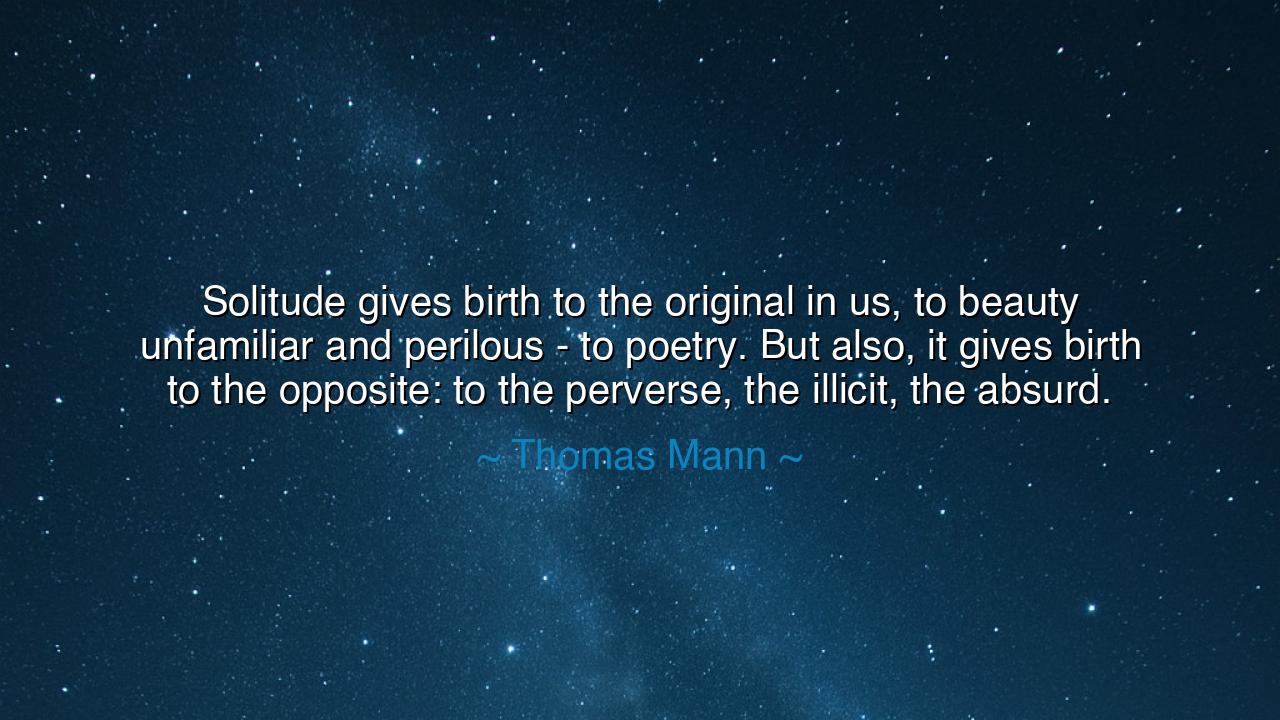
Solitude gives birth to the original in us, to beauty unfamiliar
Solitude gives birth to the original in us, to beauty unfamiliar and perilous - to poetry. But also, it gives birth to the opposite: to the perverse, the illicit, the absurd.






Host: The evening had settled into a quiet, almost sacred stillness, the room bathed in the soft, fading light from the window. Jack sat near the window, his fingers lightly drumming on the armrest, his gaze distant as though lost in thought. Jeeny sat across from him, her book forgotten in her lap, her eyes focused inward. The world outside seemed far away, as if their conversation was the only thing in the room.
Host: Thomas Mann’s words broke the silence: “Solitude gives birth to the original in us, to beauty unfamiliar and perilous - to poetry. But also, it gives birth to the opposite: to the perverse, the illicit, the absurd.” There was something provocative in that statement—the idea that solitude, while often a space for creativity and introspection, could also give birth to darker, unsettling aspects of the self. Jack, always the one to dissect ideas, was the first to speak.
Jack: His voice was slow, almost thoughtful: “I get that. Solitude can be both a place of profound creation and a place where our darker instincts come out. It’s like when we’re alone, there’s no one around to filter our thoughts, to guide us. And while that can lead to incredible creativity, it can also lead us down paths that are less savory. It’s strange how the same space—solitude—can give rise to both beauty and chaos.”
Jeeny: Her voice was gentle, but her words were full of insight: “Exactly. Solitude doesn’t just make room for beauty or originality. It also brings up the uncomfortable parts of ourselves. The parts that we might keep hidden when we’re surrounded by others. Mann’s saying that when we’re alone with ourselves, we confront not just what’s beautiful or creative, but also what’s perverse or even absurd. It’s the dual nature of solitude—it can amplify both the light and the dark within us.”
Host: The weight of her words settled between them, the quiet truth that solitude wasn’t just a refuge for creativity—it was a space that could also amplify the more complex, uncomfortable parts of the self. The room felt heavier, but in a way that seemed to open up the conversation to something deeper.
Jack: His voice softened, now reflective: “It’s like when you’re alone with your thoughts, you don’t have the distractions or the filters. Everything that’s been buried, all those things we push aside, start to surface. And sometimes, what comes up isn’t just what we want to create or express—it’s the darker parts of ourselves, the parts we’d rather not deal with. But maybe that’s where the real creativity comes from. The ability to confront all of it, the light and the dark.”
Jeeny: She nodded, her expression understanding, almost as if she had already experienced this in some way: “Exactly. It’s easy to think of creativity as something pure, something that’s just about the beautiful or the inspiring. But real creation comes from embracing all of it—good, bad, beautiful, absurd. The most powerful art, the most original thoughts, often come from that deep confrontation with the uncomfortable parts of ourselves. It’s not just about the beauty of solitude, it’s about the messiness too.”
Host: The room seemed to grow quieter, the weight of their conversation settling in. The realization that solitude wasn’t just a space for creativity, but also for confronting the darker aspects of the self, felt both liberating and unsettling. Jack and Jeeny sat in the shared understanding that the most profound creation didn’t come from ignoring the difficult parts of life, but from embracing them—the fullness of human experience, with all its contradictions.
Jack: His voice was almost whispered, as though the thought had settled deeply within him: “Maybe that’s the challenge, isn’t it? Not to escape the darker parts of ourselves, but to embrace them. To create from that space, to allow ourselves to confront the absurdities of life, the parts we don’t always want to face, and turn them into something meaningful.”
Jeeny: She smiled softly, her tone reassuring, but filled with a quiet strength: “Exactly. The light and the dark are always part of the same experience. We can’t just focus on one without acknowledging the other. It’s what makes us whole, what makes us truly alive. Creativity isn’t about creating only beauty—it’s about creating from everything we are, including the mess.”
Host: The night outside had fully settled in, the world beyond the window still and quiet. Inside, however, Jack and Jeeny had uncovered something deeper about the nature of solitude and creativity—the understanding that to truly create, to truly engage with the world and ourselves, we must embrace both the beauty and the chaos that solitude brings. There was peace in the realization that to be whole, we must confront both the light and the dark, the original and the absurd, the beautiful and the perverse. The conversation had shifted something between them—an understanding that true creativity was born not just from inspiration, but from the full, complex human experience.






AAdministratorAdministrator
Welcome, honored guests. Please leave a comment, we will respond soon